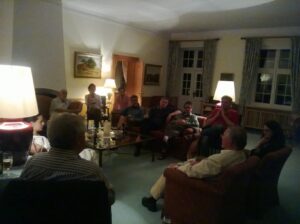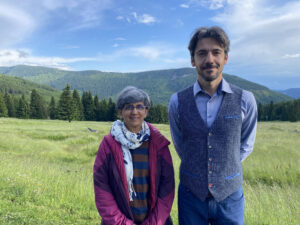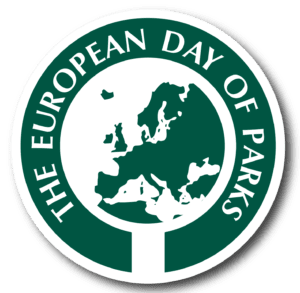End of an era – in memoriam Prof. Dr. Hans Köpp
It is with great sadness, that EUROPARC learned about the passing of Prof. Dr. Hans Köpp on 23rd of June 2023 at age 85.
With the passing of a generation, we should pause and reflect on their vision and contribution in our lives and society. It is therefore with sadness that EUROPARC reports the recent passing of Herr Köpp. He was one of the founding fathers of EUROPARC and the last to be directly connected to the very beginning of the Federation, working in close collaboration with Dr Alfred Toepfer. Working as a forest scientist, Prof. Dr Hans Köpp was, for a time, executive director of the Federation. However, his main functioning was editor of EUROPARC bulletin from 1973-1985.

EUROPARC share an evening with Prof. Dr. Hans Kopp, in Gut Siggen, regaling stories of the early days of EUROPARC.
As such, he was at the centre of news, information, ideas and connections across the European park’s community and was especially a bridge between East and West Europe. Herr Köpp, shared his inspirational story of how the first Protected Areas in Europe came together, despite the political turmoil and life behind the iron curtain for many early EUROPARC members.
Prof Dr Köpp was also very connected with the Alfred Toepfer Academy for Nature Conservation in Lower Saxony. He began cooperation with strategic partners at home and abroad at an early stage, much of which continues to this day, including EUROPARC’s close and ongoing partnership.
Some EUROPARC members had the privilege to share an evening, with Herr Köpp sharing his fascinating experiences about how the Federation was born and grew, in our 40th anniversary in 2013. It was a privilege to enjoy his witty and engaging stories. EUROPARC captured Herr Köpp’s reflections further, in this lovely film published in celebration of our 50th anniversary.
Herr Köpp was a charming gentleman, full of joy, with twinkling eyes that retained their excitement for the future of EUROPARC. We are lucky to have captured the quiet wisdom of his experience. It is both the end of an era but, too, the relentless forward march of time for the Federation. We look back to his generation with gratitude.
Our deepest condolence goes to the Köpp family.
EUROPARC participates in the World Protected Areas Leaders Forum
On 26-30 June, the World Protected Areas Leaders Forum (WPALF), initiated by IUCN, took place in the Krkonoše National Park and the Jizera Mountains Protected Landscape Area. EUROPARC Federation was represented by its President Michael Hošek.
About the Forum
Around 20 Protected Area leaders and specialists came together in the Krkonoše National Park and the Jizera Mountains Protected Landscape Area. The purpose of the meeting is not only to enable leaders in Protected Areas management to discuss and share experiences, but above all to identify the problems and challenges Protected Area managers are facing, or are likely to face. Furthermore, it offers a chance to prepare our community to respond appropriately to them.
Our protected spaces are important drivers of sustainable development
It’s time to champion our Protected Areas
Protected Areas are one of the most successful conservation tools, and their benefits can be identified on many levels. This is exactly EUROPARC’s role: to identify and promote Protected Areas as a tool that, far from just serving nature conservation, is already serving sustainable use in general.
Protected Areas support greater involvement of local communities and local governments, also in partnership with the private sector. However, to make the most of our Protected Areas, continuous investment is needed. The wealth of knowledge the global Protected Area community holds is immense. Adapting current policies to make use of this wealth is pertinent if we want the Global Biodiversity Framework, adopted in December 2022, to be a success.
As a result of the meeting, Protected Area managers signed a declaration underlining this sentiment. You can read it here:

Michael Hošek and Madhu Rao at the World Protected Areas Leaders Forum 2023.
WPALF Krkonoše – Jizera Declaration
Furthermore, EUROPARC president Michael Hošek attended a separate meeting with Dr. Madhu Rao, the Global Chair of the IUCN World Commission on Protected Areas (WCPA). They discussed further close cooperation between EUROPARC and the IUCN WCPA.
Restoration of urban marine ecosystems through Nature-based Solutions
Picture by Oleg Prachuk on Pexels.
Cities need to protect, conserve and restore urban marine ecosystems to preserve well-being and progress sustainably.
On the 13th of June 2023, a technical meeting was held in Barcelona on urban marine ecosystems restoration. This meeting was organised in the framework of the UN Restoration and Ocean Decades and the controversial forthcoming EU Restoration Law. EUROPARC’s policy and project manager Teresa Pastor took part in the event.
The meeting was hosted by the Institut de Ciències del Mar (Sea Science Institute). In 2021, they launched the Ocean Cities initiative – an international network of 27 institutions to promote sustainable ocean cities in a context in which resilience of coastal cities to climate change is a critical challenge for the coming decades.
At present, there are three reference frameworks in Europe to restore sea ecosystems in cities.
- UN Ecosystem Restoration Decade 2021-2030.
- EU Green (&Blue &Brown) Infrastructure Strategy (objective 2 of 2010-2020 Biodiversity Strategy)
- EU Nature Restoration Law – a key piece of the European Green Deal, that sets legally binding targets to rehabilitate degraded habitats, and which is currently under vote in the EP.
The invited speakers gave insight into the topic from different perspectives.
Main highlights of the meeting
The main highlights were:
- We need to protect and restore biodiversity, because both our health and economy heavily depend on it.
- The first priority should be protection– we need to protect effectively what is left.
- The second priority should be restoration – soundly applying the principles of conservation biology.
- The third priority should be effective management – applying an ecosystem-based management approach.
- Restoring marine ecosystems should go beyond introducing artificial substrates (e.g. concrete blocks) to enhance biodiversity. The aim should be to recover the fully functioning ecosystem, i.e. the whole community that was there before urbanisation.
- However, there is a lack of reference ecosystems due to the extreme exploitation oceans have been submitted causing the shifting baseline syndrome (Pauly 1995).
- With restoration projects, ecosystems can be restored to a high degree, but hardly ever to their original state, as for this we are dealing with unknowns.
- Therefore, a new concept has emerged in conservation and restoration ecology: novel ecosystems, which are ecosystems that due to human influence differ from those that prevailed historically.
- The Society for Ecological Restoration distinguishes three phases in what would be a restoration continuum:
- Reduction of impacts
- Rehabilitation – improvement, but not full restoration of the original habitat
- Ecological restoration
- Effective restoration should focus first on habitat-forming species that can act as ‘climate rescuers’ e.g. seagrasses, salt marshes, mangroves, kelp forests, coral reefs and shellfish reefs, which form natural coastal protection and thereby help to adapt to increased storminess, seal level rise and flood risks resulting from climate change.
- Secondly, the goal is to recover the whole community to obtain all the potential ecosystem services.
Restoration can be twofold:
- passive: elimination of the factors of pressure (e.g. removal of ghost nets) and let nature come back
- active: restoration of vanished species (e.g. fixing coral)
Use of Nature-based Solutions to restore urban marine ecosystems
There are different interpretations of what Nature-based Solutions (NbS) consists of. In order to harmonize the concept, the IUCN has prepared the NbS Global Standard. For further reading, also check out “Planning and delivering Nature-based Solutions in Mediterranean cities: First assessment of the IUCN NbS Global Standard in Mediterranean urban areas. Executive summary” here.
Outreach and Activity Report: European Day of Parks 2023
On the 24st of May we celebrated the European Day of Parks 2023 – Building on our Roots. This year, we brought special attention to our shared natural heritage and the responsibility we have to take care of it for future generations. Have a look at what was happening across Europe here!
European Day of Parks 2023 – Outreach and Activity Report
Thanks to the support of our members and partners on the ground, the European Day of Parks was once again a big success! The European day of Parks (EDoP) aims at bringing people closer to Nature by offering a diversity of activities and events in Protected Areas across the EUROPARC Network. The events that were organised addressed people of all ages: children, youngsters, young adults, families and seniors. This year, we focussed on “Building on our Roots”. The theme was chosen to highlight how we all have the responsibility of protecting, and expanding our natural heritage. A fitting topic, as we celebrate EUROPARC’s 50th Anniversary in 2023.
This year, it was a joy to see so many events take place once again throughout Europe! Our network led its creativity flow and over 150 events were organised and registered on our website, with many more taking place on the ground.
There was quite a buzz on social and traditional media as well, providing a great multiplier effect. Once again, the European Day of Parks put Europe’s Protected Areas in the spotlight they deserve! To get an overview of all that was happening in the media, have a look at our Media and Activity report:
The report is best viewed in Google Chrome, links might not work when using other servers.
We want to thank everyone that made this European Day of Parks a success!
Promotional materials
The EUROPARC Federation is the promoter of the European Day of Parks. To support our network, we create a special banner, that we translate into many European languages. Furthermore, we created guidelines to help Parks and Protected Areas get inspired:
About the European Day of Parks
Imagine a day when all Parks and Protected Areas come together across Europe, celebrate their successes and declare the value and benefits of Europe’s Protected Areas to communities, decision-makers and the wider public. That is EUROPARC’s European Day of Parks!
Every year, European Day of Parks takes place on and around 24th of May. It aims to bring people closer to nature and raise public awareness on the importance of the natural beauty preserved in Protected Areas and the importance of conservation and sustainable management of those places.
Check here to see the previous editions.


